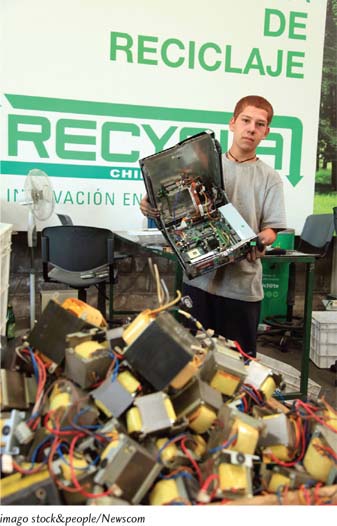Recycling E-Waste in Chile
Electronic waste is a small part of the waste stream but it contains a large fraction of waste that ends up in landfills, dumps, and other locations. Toxic metals such as lead, mercury, and cadmium as well as carcinogenic organic compounds are common in electronic waste. Recycling rates for electronic waste vary around the world. In Switzerland, more than 80 percent of electronic waste is recycled. In the United States, the recycling rate for e-waste is about 20 percent. Some countries recycle almost none of their electronic waste. For e-waste that is collected separately, fully assembled electronic devices are usually exported for disassembly and recycling elsewhere. Not only does this practice export the pollution burden, it also uses unnecessary energy and space to export the entire device rather than just the components that need recycling.

A Recycla collection site in Chile. In this facility, electronic waste is deposited for recycling, thereby keeping metals and other harmful components of electronic products from the landfill or incinerator.
(imago stock&people/Newscom)
Until the year 2000, the South American nation of Chile recycled less than 1 percent of its electronic waste. Businessman and entrepreneur Fernando Nilo decided he wanted to increase the e-waste recycling rate in Chile. He devised a business plan that won a local competition and subsequently obtained funding to launch his plan. In 2005, Recycla Chile of Santiago opened the first recycling facility in Latin America, which received electronic devices such as computers, cell phones, scanners, and televisions. While in China and other countries, workers, including children, pick apart e-waste without proper face and respiratory protection, at Recycla the workers are trained to dismantle and separate electronic components safely. Certain separated materials are sold to reputable dealers within Chile, while other materials are compacted to minimize shipping and energy costs and sent to environmentally certified metal smelters around the globe. These metal smelting companies safely recover valuable metals for recycling and use in new electronic devices. One of the innovations introduced by Recycla is the first “Green Seal” in Latin America. The manufacturer typically passes along the responsibility for recycling a product to the new owner. For example, when a customer purchases a printer, he or she is then responsible for proper disposal of that printer. Recycla introduced a program where the manufacturer contracted with Recycla to be responsible for the disposal of a product whenever the customer decides it is no longer needed. The firm that made the electronic device is financially or physically responsible for recycling that object. With this guarantee at the time of purchase, the object is much more likely to end up in a proper location at the end of its useful life, with no additional cost to the consumer.
Nilo and coworkers began a national advertising campaign both to generate revenue for their company and to educate leaders in their country and around the world about the importance of recycling electronic waste. Today Recycla promotes environmental sustainability in Chile and around the world, and provides jobs for marginalized people including prisoners and former prisoners. The company is profitable and has received many awards. When Recycla started, Chile was recycling less than 1 percent of its electronic waste, though it had a goal to recycle 10 percent within a few years. In 2009, Recycla reported that they had achieved a 5 percent recycling rate in Chile, well on the way to their goal and more than five times higher than the recycling rate when they started.
Critical Thinking Questions
What are some of the barriers to e-waste recycling?
Are you aware of any e-waste recycling activities in your community? Are they well publicized? Can you think of ways to enhance them?
Information Development Incubator Support Center.
Environmental Impact of IT Solutions: Recycling E-Waste in Chile.
http://www.infodev.org/highlights/network-member-client-companies-compete-ebn-smart-entrepreneurship-award.
Recycla Chile, SA. Solving the E-Waste Problem (company report), 2010.
 sustainability
sustainability